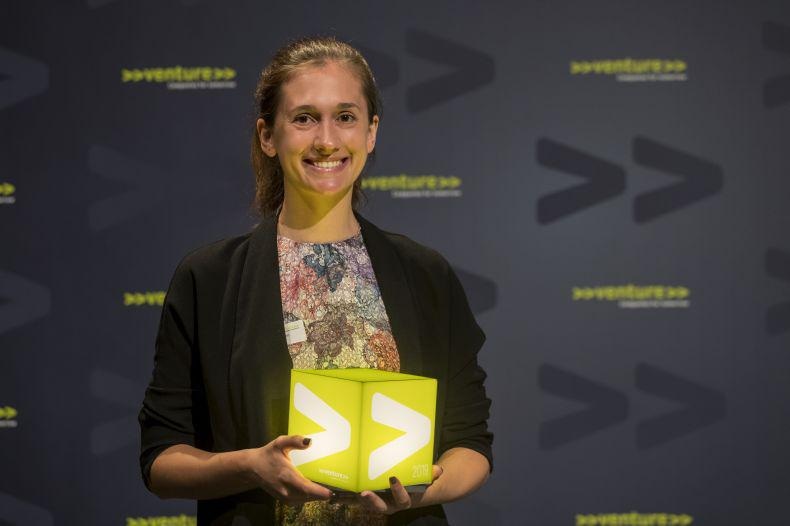Jul 19 2019
A chemical-based method for recycling PET containers has been developed by DePoly, a startup based at EPFL’s Valais-Wallis campus. The process offers various benefits over current technology and has just won the company first place at the 2019 >>venture>> competition.
 Samantha Anderson, founder of DePoly, at the awards ceremony >>venture>> (Image credit: Alessandro Della Bella)
Samantha Anderson, founder of DePoly, at the awards ceremony >>venture>> (Image credit: Alessandro Della Bella)
Despite the fact that there already exist methods for recycling PET, the current systems have many limitations. For instance, it is not possible to produce plastic bottles made fully of recycled PET—at least a few of the raw materials ought to be new.
“That means purchasing them from refineries, which convert oil into ethylene glycol and terephthalic acid, the two compounds needed to make PET,” remarked Samantha Anderson, founder and CEO of DePoly and a PhD student at the Laboratory of Molecular Simulation (LSMO) at EPFL’s Valais-Wallis campus.
Moreover, numerous PET containers cannot be recycled since they contain chemical and food contaminants, dyes, or additives—almost all these containers are eventually incinerated.
Recycling Through Depolymerization
A new method that can recycle almost any PET container was developed by DePoly. This method uses a chemical process that can disintegrate the plastic into its base compounds. “It doesn’t matter if the container held water, peanut butter or soap, or if it’s crystal clear or pitch black,” stated Anderson.
In this new method, PET containers need not be sorted by color, which means that all of them can be processed as a group. This method can also be used with fabrics such as polyester, for instance, converting old t-shirts into cotton and PET fibers.
The chemical process involved here is depolymerization of PET, and thus the name DePoly.
We combine the plastic with various compounds in a reactor and then apply light to the mixture to trigger a series of chemical reactions. These reactions break the bonds between the ethylene glycol and terephthalic acid, freeing up the compounds for further use.
Samantha Anderson, Founder and CEO, DePoly
The process produces ethylene glycol in clear liquid form and terephthalic acid as a white powder, which can then be easily isolated. The process also produces a small amount of additives, dyes, and other waste. Anderson will not disclose any further details as she is yet to obtain a patent for the new method.
An Award-Winning Innovation
DePoly participated in the 2019 >>venture>> competition—a Swiss entrepreneurship competition held each year by EPFL, ETH Zurich, McKinsey & Company, Knecht Holding, and Innosuisse—in the Hardware category and received the grand prize.
The winners of the competition received 150,000 francs and a package of business consulting services. They can also join the >>venture>> network to make contacts and improve their visibility.
Anderson developed the method in collaboration with two LSMO coworkers, Christopher Ireland (Postdoc) and Bardiya Valizadeh (PhD student). “DePoly had already received funding from the Swiss National Science Foundation and an Innogrant before winning >>venture>>,” remarked Professor Berend Smit, head of LSMO, the laboratory that supported the study. “I’m very proud of the team’s success.”
Tests on an Industrial Scale
The aim of DePoly would be to improve its method from the laboratory to industry in future. “In November, we will begin building a pilot unit with more capacity than the lab,” stated Anderson. The unit is situated at the Central Valais Waste Treatment Plant in Uvrier and would enable the startup to analyze and improve its method to perform well under industrial environment.
The testing phase will probably last a year. I’m sure chemical recycling methods for PET will eventually hit the market—if not our method, then someone else’s. We aren’t the only ones working on this approach.
Samantha Anderson, Founder and CEO, DePoly
Meanwhile, Anderson has split her time between writing her thesis and managing DePoly. After obtaining her degree in November, she will be completely committed to her project, which can help clean up the plastics causing environmental pollution.
DePoly was also supported by The Ark, a local business incubator.